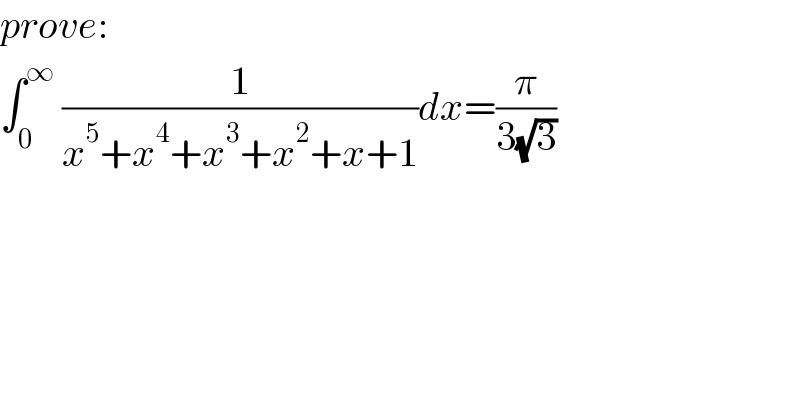
Question Number 158405 by Eric002 last updated on 03/Nov/21

$${prove}: \\ $$$$\int_{\mathrm{0}} ^{\infty} \:\frac{\mathrm{1}}{{x}^{\mathrm{5}} +{x}^{\mathrm{4}} +{x}^{\mathrm{3}} +{x}^{\mathrm{2}} +{x}+\mathrm{1}}{dx}=\frac{\pi}{\mathrm{3}\sqrt{\mathrm{3}}} \\ $$
Answered by MJS_new last updated on 03/Nov/21

$${x}^{\mathrm{5}} +{x}^{\mathrm{4}} +{x}^{\mathrm{3}} +{x}^{\mathrm{2}} +{x}+\mathrm{1}=\frac{{x}^{\mathrm{6}} −\mathrm{1}}{{x}−\mathrm{1}} \\ $$$$\Rightarrow \\ $$$$\int\frac{{dx}}{{x}^{\mathrm{5}} +{x}^{\mathrm{4}} +{x}^{\mathrm{3}} +{x}^{\mathrm{2}} +{x}+\mathrm{1}}= \\ $$$$=\int\frac{{dx}}{\left({x}+\mathrm{1}\right)\left({x}^{\mathrm{2}} +{x}+\mathrm{1}\right)\left({x}^{\mathrm{2}} +{x}+\mathrm{1}\right)}= \\ $$$$=\frac{\mathrm{1}}{\mathrm{3}}\int\frac{{dx}}{{x}+\mathrm{1}}+\frac{\mathrm{1}}{\mathrm{2}}\int\frac{{dx}}{{x}^{\mathrm{2}} +{x}+\mathrm{1}}−\frac{\mathrm{1}}{\mathrm{6}}\int\frac{\mathrm{2}{x}−\mathrm{1}}{{x}^{\mathrm{2}} −{x}+\mathrm{1}}= \\ $$$$=\frac{\mathrm{1}}{\mathrm{3}}\mathrm{ln}\:\mid{x}+\mathrm{1}\mid\:+\frac{\sqrt{\mathrm{3}}}{\mathrm{3}}\mathrm{arctan}\:\frac{\mathrm{2}{x}+\mathrm{1}}{\:\sqrt{\mathrm{3}}}\:−\frac{\mathrm{1}}{\mathrm{6}}\mathrm{ln}\:\left({x}^{\mathrm{2}} −{x}+\mathrm{1}\right)\:+{C} \\ $$$$\Rightarrow \\ $$$$\underset{\mathrm{0}} {\overset{\infty} {\int}}\frac{{dx}}{{x}^{\mathrm{5}} +{x}^{\mathrm{4}} +{x}^{\mathrm{3}} +{x}^{\mathrm{2}} +{x}+\mathrm{1}}=\frac{\pi}{\mathrm{3}\sqrt{\mathrm{3}}} \\ $$
Commented by Eric002 last updated on 03/Nov/21

$${well}\:{done} \\ $$
Commented by Tawa11 last updated on 04/Nov/21

$$\mathrm{Great}\:\mathrm{sir} \\ $$
Answered by Ar Brandon last updated on 03/Nov/21
![I=∫_0 ^∞ (dx/(x^5 +x^4 +x^3 +x^2 +x+1))=∫_0 ^∞ ((1−x)/(1−x^6 ))dx =∫_0 ^1 ((1−x)/(1−x^6 ))dx+∫_1 ^∞ ((1−x)/(1−x^6 ))dx=∫_0 ^1 ((1−x)/(1−x^6 ))dx+∫_0 ^1 ((x^3 −x^4 )/(1−x^6 ))dx =∫_0 ^1 ((1−x+x^3 −x^4 )/(1−x^6 ))dx=(1/6)∫_0 ^1 ((v^(−(5/6)) −v^(−(4/6)) +v^(−(2/6)) −v^(−(1/6)) )/(1−v))dv =(1/6)[−ψ((1/6))+ψ((2/6))−ψ((4/6))+ψ((5/6))] =(1/6)[(ψ((5/6))−ψ((1/6)))+(ψ((1/3))−ψ((2/3)))] =(1/6)[−πcot((5/6)π)−πcot((π/3))]=(1/6)[π(√3)−(π/( (√3)))]=((2(√3)π)/(18))=((√3)/9)π](Q158414.png)
$${I}=\int_{\mathrm{0}} ^{\infty} \frac{{dx}}{{x}^{\mathrm{5}} +{x}^{\mathrm{4}} +{x}^{\mathrm{3}} +{x}^{\mathrm{2}} +{x}+\mathrm{1}}=\int_{\mathrm{0}} ^{\infty} \frac{\mathrm{1}−{x}}{\mathrm{1}−{x}^{\mathrm{6}} }{dx} \\ $$$$\:\:=\int_{\mathrm{0}} ^{\mathrm{1}} \frac{\mathrm{1}−{x}}{\mathrm{1}−{x}^{\mathrm{6}} }{dx}+\int_{\mathrm{1}} ^{\infty} \frac{\mathrm{1}−{x}}{\mathrm{1}−{x}^{\mathrm{6}} }{dx}=\int_{\mathrm{0}} ^{\mathrm{1}} \frac{\mathrm{1}−{x}}{\mathrm{1}−{x}^{\mathrm{6}} }{dx}+\int_{\mathrm{0}} ^{\mathrm{1}} \frac{{x}^{\mathrm{3}} −{x}^{\mathrm{4}} }{\mathrm{1}−{x}^{\mathrm{6}} }{dx} \\ $$$$\:\:=\int_{\mathrm{0}} ^{\mathrm{1}} \frac{\mathrm{1}−{x}+{x}^{\mathrm{3}} −{x}^{\mathrm{4}} }{\mathrm{1}−{x}^{\mathrm{6}} }{dx}=\frac{\mathrm{1}}{\mathrm{6}}\int_{\mathrm{0}} ^{\mathrm{1}} \frac{\mathrm{v}^{−\frac{\mathrm{5}}{\mathrm{6}}} −\mathrm{v}^{−\frac{\mathrm{4}}{\mathrm{6}}} +\mathrm{v}^{−\frac{\mathrm{2}}{\mathrm{6}}} −\mathrm{v}^{−\frac{\mathrm{1}}{\mathrm{6}}} }{\mathrm{1}−\mathrm{v}}{d}\mathrm{v} \\ $$$$\:\:=\frac{\mathrm{1}}{\mathrm{6}}\left[−\psi\left(\frac{\mathrm{1}}{\mathrm{6}}\right)+\psi\left(\frac{\mathrm{2}}{\mathrm{6}}\right)−\psi\left(\frac{\mathrm{4}}{\mathrm{6}}\right)+\psi\left(\frac{\mathrm{5}}{\mathrm{6}}\right)\right] \\ $$$$\:\:=\frac{\mathrm{1}}{\mathrm{6}}\left[\left(\psi\left(\frac{\mathrm{5}}{\mathrm{6}}\right)−\psi\left(\frac{\mathrm{1}}{\mathrm{6}}\right)\right)+\left(\psi\left(\frac{\mathrm{1}}{\mathrm{3}}\right)−\psi\left(\frac{\mathrm{2}}{\mathrm{3}}\right)\right)\right] \\ $$$$\:\:=\frac{\mathrm{1}}{\mathrm{6}}\left[−\pi\mathrm{cot}\left(\frac{\mathrm{5}}{\mathrm{6}}\pi\right)−\pi\mathrm{cot}\left(\frac{\pi}{\mathrm{3}}\right)\right]=\frac{\mathrm{1}}{\mathrm{6}}\left[\pi\sqrt{\mathrm{3}}−\frac{\pi}{\:\sqrt{\mathrm{3}}}\right]=\frac{\mathrm{2}\sqrt{\mathrm{3}}\pi}{\mathrm{18}}=\frac{\sqrt{\mathrm{3}}}{\mathrm{9}}\pi \\ $$
Commented by Ar Brandon last updated on 03/Nov/21

$$\:\:\:\:\Phi=\int_{\mathrm{1}} ^{\infty} \frac{\mathrm{1}−{x}}{\mathrm{1}−{x}^{\mathrm{6}} }{dx},\:{u}=\frac{\mathrm{1}}{{x}}\Rightarrow{x}=\frac{\mathrm{1}}{{u}}\Rightarrow{dx}=−\frac{\mathrm{1}}{{u}^{\mathrm{2}} }{du} \\ $$$$\Rightarrow\Phi=\int_{\mathrm{0}} ^{\mathrm{1}} \frac{\mathrm{1}−\frac{\mathrm{1}}{{u}}}{\mathrm{1}−\frac{\mathrm{1}}{{u}^{\mathrm{6}} }}\centerdot\frac{{du}}{{u}^{\mathrm{6}} }=\int_{\mathrm{0}} ^{\mathrm{1}} \frac{{u}^{\mathrm{4}} −{u}^{\mathrm{3}} }{{u}^{\mathrm{6}} −\mathrm{1}}{du}=\int_{\mathrm{0}} ^{\mathrm{1}} \frac{{x}^{\mathrm{3}} −{x}^{\mathrm{4}} }{\mathrm{1}−{x}^{\mathrm{6}} }{dx} \\ $$
